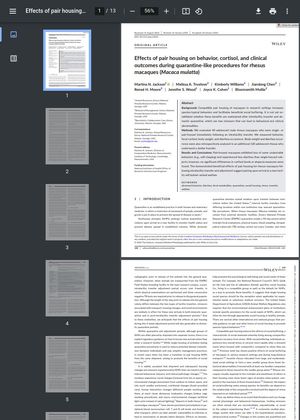TLDR Pair housing reduces stress behaviors and health issues in quarantined rhesus macaques.
The study evaluated the impact of pair housing on 40 adolescent male rhesus macaques following an intrafacility transfer, a situation analogous to quarantine. The researchers compared behavior, fecal cortisol levels, body weight, and diarrhea occurrence between single- and pair-housed macaques. Additionally, they retrospectively analyzed body weight and diarrhea occurrence in another 120 macaques who underwent a similar transfer. The results showed that pair-housed macaques engaged in fewer undesirable behaviors, such as self-clasping, and had a lower incidence of diarrhea compared to single-housed individuals. However, there were no significant differences in cortisol levels or alopecia between the two groups. The findings suggest that pair housing can improve welfare by reducing stress-related behaviors and health issues during post-transfer adjustment periods.
21 citations
,
June 2016 in “Journal of Medical Primatology” Captive management practices affect hair loss and stress in rhesus monkeys, with differences between facilities.
 17 citations
,
November 2013 in “American Journal of Primatology”
17 citations
,
November 2013 in “American Journal of Primatology” Different monkey species in a lab showed varying levels of hair loss due to factors like type, sex, age, season, and living conditions.
 51 citations
,
November 2005 in “Journal of Medical Primatology”
51 citations
,
November 2005 in “Journal of Medical Primatology” Alopecia in captive rhesus macaques is affected by season, sex, age, housing, and stress, with complex links between stress hormones and hair loss.
 4 citations
,
September 2017 in “Skin appendage disorders”
4 citations
,
September 2017 in “Skin appendage disorders” The dog with an Alopecia Areata-like condition showed signs of an autoimmune disease and partially regrew hair without treatment, suggesting dogs could be models for human AA research.
6 citations
,
January 2019 in “Annals of Occupational and Environmental Medicine” Long working hours increase the risk of hair loss in Korean male workers.
 10 citations
,
November 2015 in “American Journal of Primatology”
10 citations
,
November 2015 in “American Journal of Primatology” Monkeys with more anxious or inhibited temperaments tend to have less hair loss.
 November 2022 in “IntechOpen eBooks”
November 2022 in “IntechOpen eBooks” Hair loss can significantly impact a person's mental health, causing issues like anxiety and depression, and stress can trigger hair loss.
29 citations
,
January 2023 in “Journal of Clinical Medicine” Psychological interventions can improve mental health and quality of life in people with alopecia.





